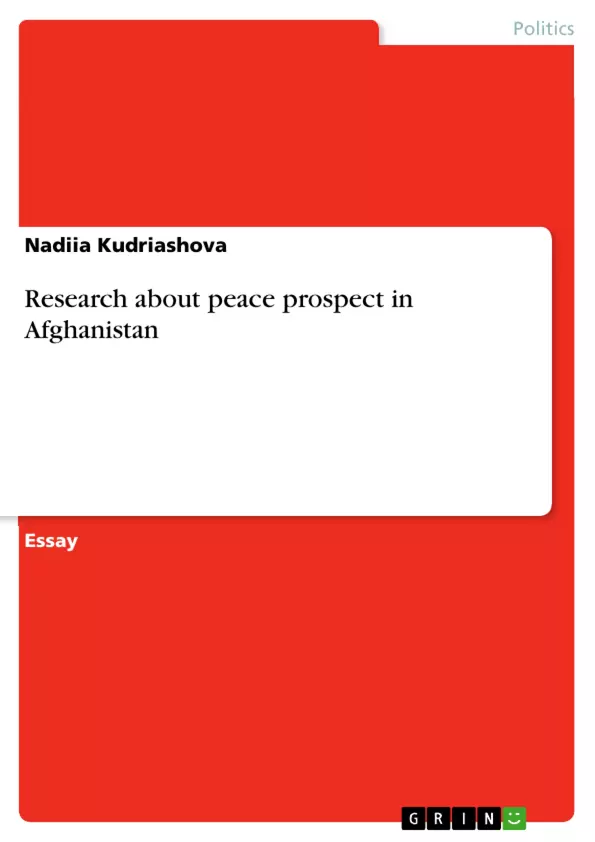The events taking place in the Islamic Republic of Afghanistan at present (such as the withdrawal of foreign troops, the strengthening of the Taliban forces, the increase in drug trafficking, the change in the ruling elite) are of concern to the entire world community. Preservation of stability and security in Afghanistan and the region of Central Asia requires a more thorough and coordinated approach from all stakeholders in this process. The current stalemate resulting from the attempt to forcefully unleash the "Afghan knot" once again demonstrates to the world the futility of a military solution to the problem.
Inhaltsverzeichnis (Table of Contents)
- The Afghan Conflict and the Geopolitical Context
- The Current Situation in Afghanistan
- The Role of the International Community
- The Taliban and its Influence
- The Rise of ISIS in Afghanistan
- China's Strategic Interests in Afghanistan
- Security Concerns and Economic Opportunities
- Countering Extremism and Drug Trafficking
- Strengthening Relations with Pakistan
- The Role of India and Pakistan in the Afghan Conflict
- India's Focus on Stability and Economic Development
- Pakistan's Concerns about Ethnic Tensions
- Iran's Attempts to Expand Influence
- The SCO and the Afghan Peace Process
- The Importance of Regional Cooperation
- The SCO-Afghanistan Contact Group
- The Need for Multilateral Coordination
Zielsetzung und Themenschwerpunkte (Objectives and Key Themes)
This text examines the ongoing conflict in Afghanistan and the complexities of finding a peaceful resolution. It explores the geopolitical interests of various regional powers, including China, India, Pakistan, and Iran, and analyzes how these interests influence the situation in Afghanistan.
- The multifaceted nature of the Afghan conflict, encompassing political, economic, and security challenges.
- The role of regional powers and their strategic interests in shaping the Afghan landscape.
- The importance of international cooperation and a multilateral approach to achieving peace in Afghanistan.
- The impact of the conflict on regional stability and security, particularly in Central Asia.
- The need for a comprehensive strategy that addresses the root causes of the conflict, including poverty, corruption, and ethnic tensions.
Zusammenfassung der Kapitel (Chapter Summaries)
The text begins by providing an overview of the current situation in Afghanistan, highlighting the Taliban's resurgence and the challenges facing the Afghan government and security forces. It then examines the role of the international community, particularly NATO and the United States, in the Afghan conflict.
Subsequent chapters explore the strategic interests of China, India, and Pakistan in Afghanistan. China's focus on security and economic opportunities, India's efforts to stabilize the country and counter terrorism, and Pakistan's concerns about ethnic tensions and the potential for instability are discussed. The text also explores Iran's attempts to expand its influence in Afghanistan.
The final sections examine the role of the Shanghai Cooperation Organisation (SCO) in the Afghan peace process, highlighting the importance of regional cooperation and the need for a multilateral approach to resolving the conflict. The text concludes by emphasizing the need for a comprehensive strategy that addresses the root causes of the conflict and promotes long-term peace and stability in Afghanistan.
Schlüsselwörter (Keywords)
The text focuses on the Afghan conflict, geopolitical interests, regional powers, international cooperation, peace process, stability, security, Taliban, ISIS, China, India, Pakistan, Iran, SCO, Central Asia, and multilateralism.
Frequently Asked Questions
What is the main subject of this research?
The research examines the prospects for peace in Afghanistan, focusing on the current geopolitical situation and the interests of regional powers.
Which regional powers' interests are analyzed in the text?
The text analyzes the strategic interests of China, India, Pakistan, and Iran in relation to the Afghan conflict.
What does the text say about a military solution in Afghanistan?
It argues that the current stalemate demonstrates the futility of a military solution and highlights the need for a coordinated, non-military approach.
What is China's primary interest in Afghanistan?
China's interests are focused on security concerns, economic opportunities, and countering extremism and drug trafficking.
What role does the Shanghai Cooperation Organisation (SCO) play?
The SCO is highlighted as a platform for regional cooperation and multilateral coordination in the Afghan peace process.
What are identified as the root causes of the conflict?
The text identifies poverty, corruption, and ethnic tensions as root causes that must be addressed for long-term stability.
- Quote paper
- Nadiia Kudriashova (Author), 2018, Research about peace prospect in Afghanistan, Munich, GRIN Verlag, https://www.grin.com/document/484481



